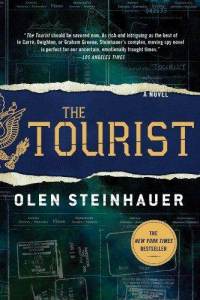 The Spy Who Went Into the Cold
The Spy Who Went Into the Cold
Steinhauer, Olen (2009). The Tourist. New York: Minotaur/St.Martins.
This is a well-written spy novel, which measures up to some of Le Carre’s lesser works, such as The Mission Song or Single & Single. As with Le Carre, Steinhauer’s characters are driven by personal and interpersonal motives. Violence is minimal and Bondian gadgets nonexistent.
The protagonist, Milo Weaver, is called back into active CIA “black ops” duty to find out if an old friend in Paris is actually selling secrets to the Chinese. The black ops organization is called the Tourist Agency, and operatives are Tourists. Reluctantly, Weaver tears himself away from his wife and daughter to do one last job. Not surprisingly, things take a turn for the worse and it will be three hundred pages before the adventure is over, and by that time, the wife has lost patience and left him.
The writing is solid, imaginative, and non-cliched, good enough to keep the pages turning. Here are some random samples:
“Librarians.” Grainger sniffed at the traveler. “You should’ve listened to me. There are absolutely no odds in marrying smart women.”
Milo had always been a many-key kind of man. He had a key to his car, his apartment, his desk in the office, Tina’s parents’ house in Austin, and one unmarked key that—were he asked—he would say led to his apartment building’s shared basement. In truth that key opened this storage space.
Structurally, the book is flawed. There is a completely unhelpful prologue, six chapters long, which contributes very little to the story, does little to introduce characters, tone, or mood, and the events of which are summarized in detail three hundred pages later. Then, the main story seemingly ends on page 396 when a CIA mole is uncovered, but no. That’s only when another section of 17 chapters starts, a sort of extended epilogue in which all sorts of melodramatic information is introduced in elaboration of the main characters’ backstories – who is really married to whom, who actually fathered which child, and so on. None of it matters to the main story, which is already over.
There are lots of red herrings, and maybe that is legitimate, but loose ends are inexcusable. There are also long passages of pointless speculation about what “really” happened and which bad guys under which of their many aliases might have been involved in which connections. The reader does not care about any of that because the author has failed to make sufficient emotional connection among the characters. The weak storytelling thus diminishes the strong writing.
